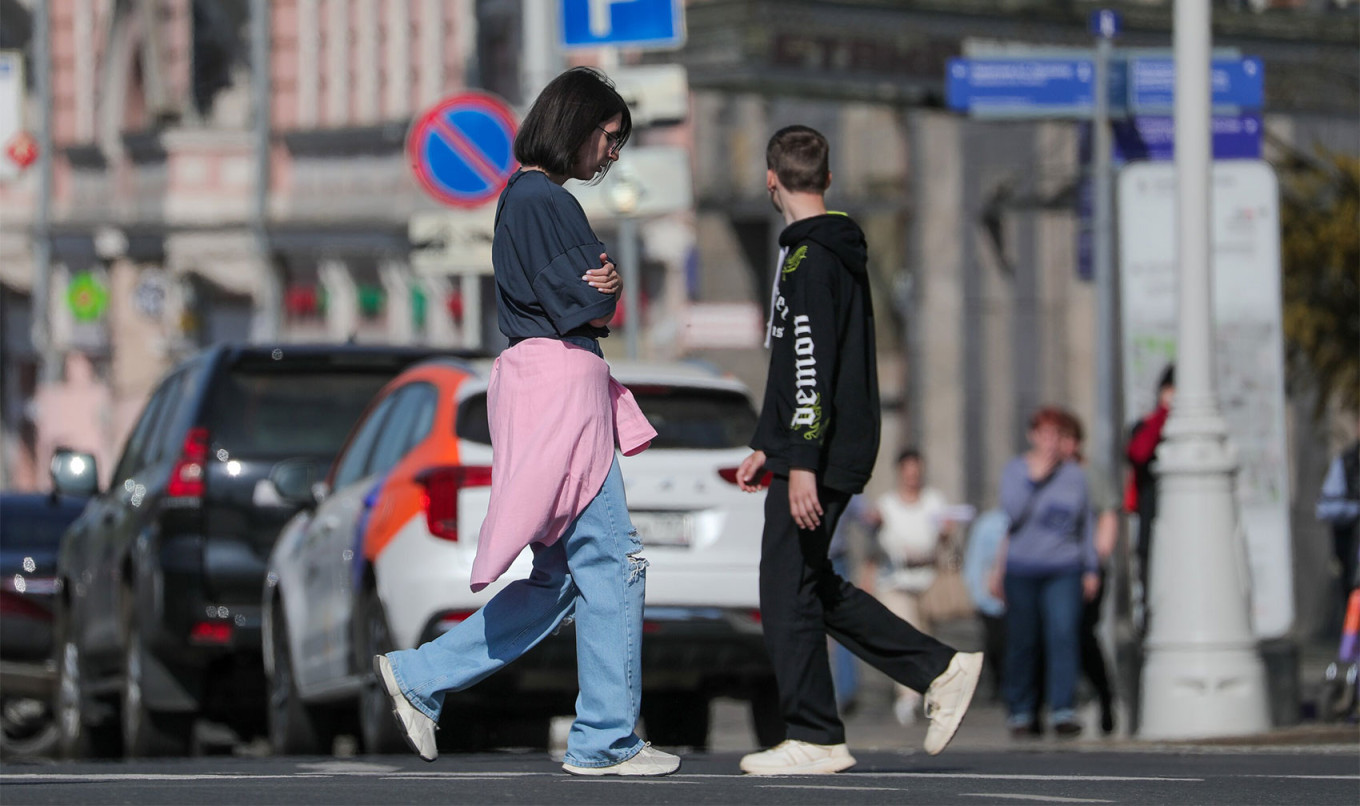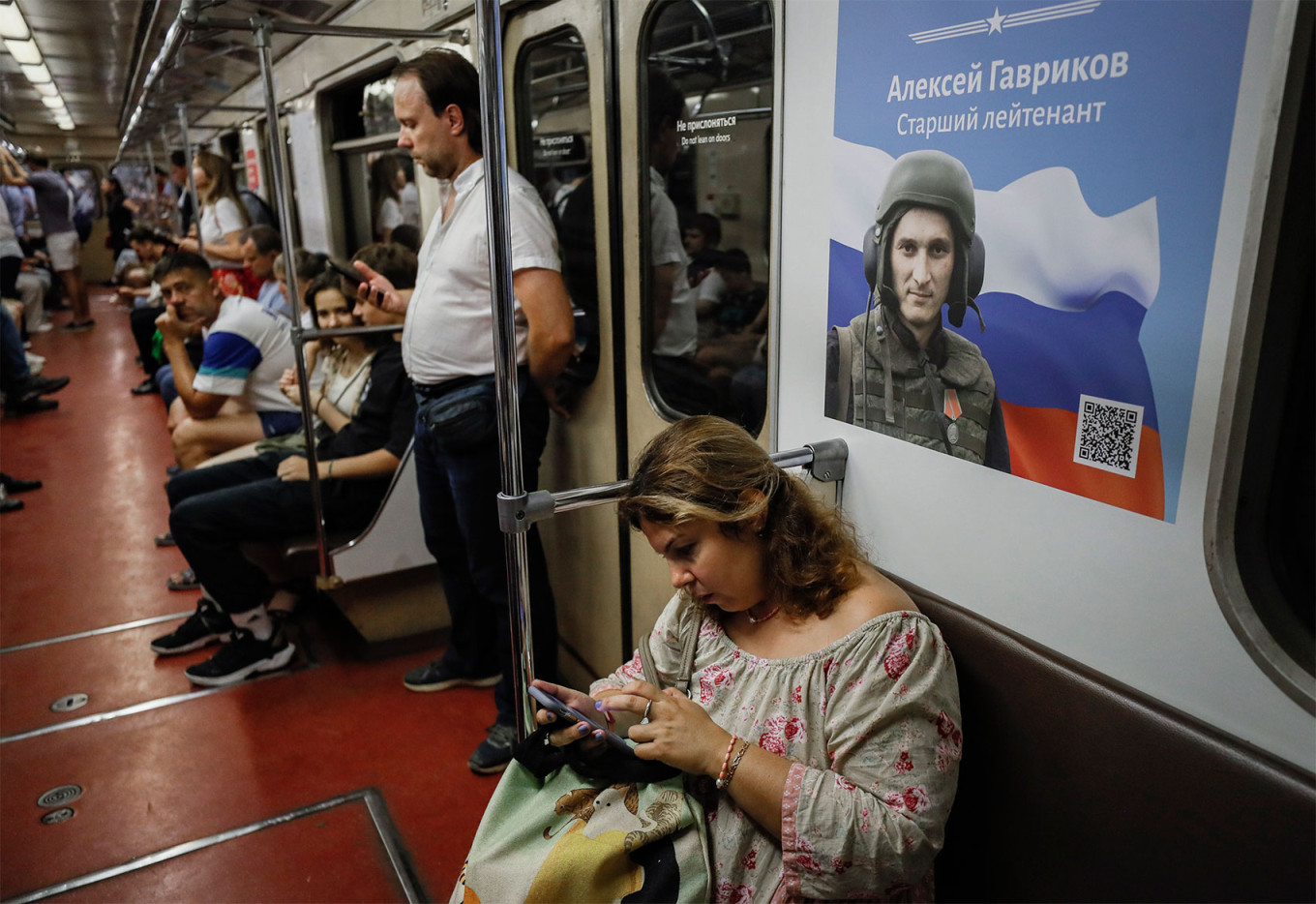When Russia launched its full-scale invasion of Ukraine last year, Moscow-born Ukrainian Marika Semenenko decided to flee abroad.
“It was clear from the beginning that it would be impossible to speak out against the war and staying silent wasn’t an option for me,” the entrepreneur and activist who has since settled in Armenia told The Moscow Times.
“My mom got really scared and told me ‘first they will kill all Ukrainians there and then they will come for the Ukrainians in Russia’.”
Kremlin rhetoric delegitimizing Ukrainian statehood and linking Ukrainians with “Nazis” amid the 15-month invasion has made it increasingly risky for anyone in Russia to display a public affiliation with Kyiv, putting unprecedented pressure on Russia’s large Ukrainian diaspora and tearing families apart.
While some ethnic Ukrainians back the Kremlin and tens of thousands of refugees from the fighting have settled in Russia, those opposed to the war face a difficult choice between leaving, blending in or risking a jail sentence for voicing anti-war views.
While Semenenko moved to Armenia’s capital Yerevan, her parents remained in Moscow.
Her father, who was born in Ukraine and headed two Ukrainian groups in Russia before they were forced to close in 2010, said the diaspora was facing unprecedented challenges.
“The social atmosphere in Russia doesn’t even allow for the preservation of the existing diaspora, let alone its development,” Valery Semenenko told The Moscow Times.
“The trend is for complete, all-around assimilation.”
The Ukrainian diaspora in Russia has traditionally been among the largest in the world with as many as 2.9 million Russian residents identifying as Ukrainian in the 2002 census. However, this fell to 1.9 million in 2010 and to just 800,000 in 2020.

Some Ukrainians in Russia told The Moscow Times that they have suffered discrimination because of their ethnicity over the last year.
A teacher from Russia’s northern republic of Komi who requested anonymity said he was forced to resign after refusing to take part in pro-war activities.
“I couldn’t hold myself back after the full-scale invasion began and started to carefully hint to the kids [that the war isn’t right],” said the Ukrainian man.
When he refused to hold a moment of silence for fallen Russian soldiers during his lessons, he said he was asked to resign. He left Russia soon after quitting his job.
Worsening relations between Russia and Ukraine has long made it much difficult — and sometimes dangerous — for Ukrainians in Russia to display their ethnic identity.
But this has become much worse since the Kremlin sent tanks across the border last year.
While there is the risk of jail sentences under wartime censorship laws, activists also point to what appears to be an accelerating push to assimilate Ukrainians into Russian culture.
An ex-volunteer at a Ukrainian cultural center in Russia told The Moscow Times she left her job after the start of the war.
“A lot of my colleagues have changed their approach,” said the woman, who requested anonymity. “Instead of events dedicated to Ukrainian writers, they began to talk about Russian writers, and they call Russian their native language.”
Ukraine’s 2004 Orange Revolution is commonly considered to mark the start of the country’s drift away from Moscow’s orbit and toward that of the European Union.
And the pressure on Ukrainian cultural institutions and diaspora activists in Russia intensified after Moscow’s 2014 annexation of Crimea and support for rebels in eastern Ukraine.
In addition to closing the two institutions headed by Semenenko, Russian authorities shut down the flagship State Library of Ukrainian Literature in Moscow in 2015 and handed a four-year suspended prison sentence to its director Natalia Sharina.
In 2019, Russia banned the largest organization of Ukrainians living outside Ukraine, the Ukrainian World Congress.
Pressure to assimilate, however, has been felt by ordinary Ukrainians in Russia for decades — leading many to choose to suppress their identity.
“My father’s friends in the diaspora were always surprised by the fact that he raised my brother and me as Ukrainians,” said Marika Semenenko, 36.

“Many kids refused [to learn the language] due to negative attitudes toward expressing Ukrainian identity. I also went through every stage: from defiance, to acceptance, to pride.”
In addition, the war has disproportionately affected Russia’s Ukrainians because they are more likely than Russians of other ethnicities to have relatives caught up in the fighting on the ground.
The Semenenkos, for example, have relatives living in several parts of Ukraine — including Kherson, which spent eight months under Russian occupation last year.
Both Marika Semenenko and the teacher from Komi said they would like to travel to Ukraine to see their family and friends as well as to offer help on the ground — but entering Ukraine for Russian passport holders is now almost impossible, regardless of their heritage.
“In Ukraine, the dominant view is that citizens of Russia need to be cut off completely,” said Valeriy Semenenko.
“That is correct, but the problem is that they are including us, their compatriots [in that definition].”
Meanwhile, Ukrainians in Russia who have close relatives in Ukraine find themselves faced with an impossible dilemma.
Oksana, who moved to Moscow in 2013 from Ukrainian port city Odesa after falling in love with a Russian man, said the war has led to hostility from her Russian friends and strained her relations with her family in Ukraine.
“Now almost everyone has turned away from me. Many Russian friends say I’m a Bandera-ite,” Oksana, 25, told The Moscow Times, referring to the Ukrainian far-right leader whose name is commonly used as a slur by Russian officials.
“My mother remained in Odesa. My sister is a refugee in Poland. My Russian husband could be called up for military service,” she said, requesting anonymity to speak freely.
“This is not a normal life.”